1998年9月7日,google诞生在加州郊区的一个车库内,本周日即将迎来10周岁生日。 先说句google生日快乐o(∩_∩)o...哈哈
10年期间,google从一家只有几人的小公司发展成近2万名员工的跨国企业。公司市值达到了1396.9亿美元(2008.09.06行情),在科技公司中位居第四。以下为google10年来的主要发展历程:
1. 1998年:车库内诞生
从Sun联合创始人安迪·贝克托斯海姆(Andy Bechtolsheim)手中获10万美元投资后,拉里·佩奇(Larry Page)和赛吉·布林(Sergey Brin)于1998年9月7日在加州郊区的一个车库内创立google。
你知道吗:google的第一个数据中心就坐落在这个56平方米(7米x 8米) 的房间里。
员工数量:不到10人
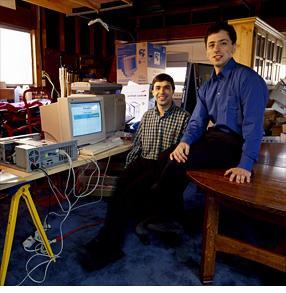
2. 1999年:融资2500万美元
尽管当时的互联网搜索是AltaVista、Excite、Lycos和雅虎的天下,但google首轮即融资2500万美元。成立6个月后,google办公室从车库搬到Palo Alto附近的办公楼内。
你知道吗:google最初Logo后面带有一个感叹号。
员工数量:不到50人
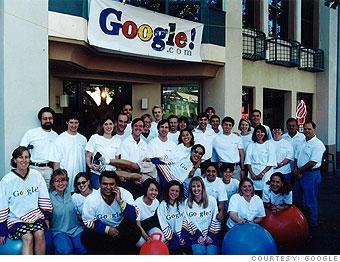
3. 2000年:推出AdWords
google网页索引量达到10亿幅,成为全球最大搜索引擎。6月,google与雅虎签约,为雅虎提供搜索服务。10月,google推出AdWords广告系统。
你知道吗:google首次进军移动市场的合作伙伴是Palm。
员工数量:不到150人
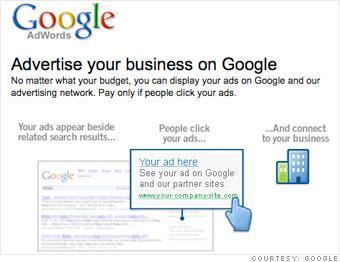
4. 2001年:埃里克·施密特出任CEO
8月,埃里克·施密特(Eric Schmidt)取代联合创始人佩奇出任googleCEO。施密特曾任Sun首席技术官、Novell CEO等职。这一年,google首次实现盈利。
你知道吗:google这一年推出了“您是不是要找……”检查拼写错误功能。
营收:8640万美元
利润:699万美元
员工数量:250人
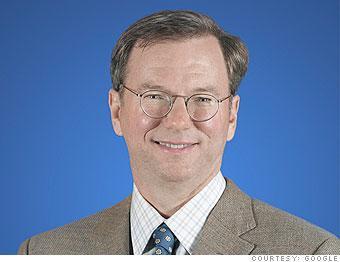
5. 2002年:网络泡沫破灭后依然强劲
尽管网络泡沫破灭,但google依然势如破竹。AOL时代华纳首席运营官鲍勃·皮特曼(Bob Pittman)将google称之为“地位进一步巩固的搜索之王”。当年,google推出新版AdWords。
你知道吗:雅虎从网站上摘下googleLogo(不再使用google搜索)。
营收:4.39亿美元
利润:9900万美元
营收涨幅:409%
员工数量:500
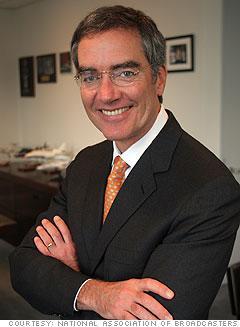
6. 2003年:推出AdSense
AdWords大获成功后,google6月推出了AdSense。这一年,google上市传闻开始盛行,分析师预期google价值250亿美元。
你知道吗:微软曾考虑收购google。
营收:14.7亿美元
利润:1.06亿美元
营收涨幅:234%
员工数量:1300

7. 2004年:google上市
8月19日,google上市,发行价85美元,年底攀升至195美元。
你知道吗:google开会时间都是在整点后的7分钟开始,灵感来自某些大学的作息制度。
营收:31.9亿美元
利润:3.99亿美元
营收涨幅:118%
员工数量:3021
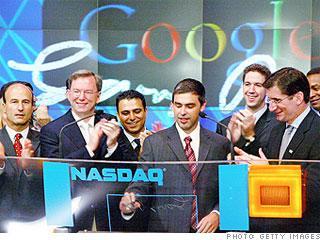
8. 2005年:google更强大
随着google的不断壮大,对微软和雅虎的威胁也越来越大。这一年,google推出了个性化主页服务,直接与雅虎和MSN形成竞争。此外,由于“李开复事件”,google还与微软对簿公堂。
你知道吗:google海外员工比例占1/4。
营收:61.4亿美元
利润:14.7亿美元
营收涨幅:92.5%
员工数量:5680
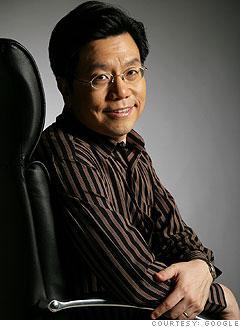
9. 2006年:进军网络视频
这一年,google以16.5亿美元收购视频网站YouTube。此外,google还与MySpace合作推广文本广告。
你知道吗:“Google”被《牛津英语词典》和《韦氏大词典》收录为动词。
营收:106亿美元
利润:30.8亿美元
营收涨幅:72.8%
员工数量10674
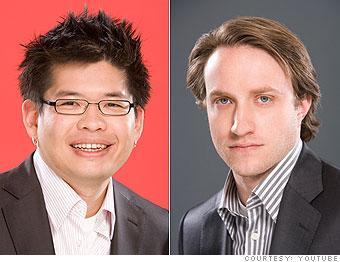
10. 2007年:成长的烦恼
在被《财富》杂志评为“最佳雇主”的同时,又陆续有高管离职。
你知道吗:google调整隐私策略,将搜索数据保存时间降至18个月。
营收:166亿美元
利润:42亿美元
营收涨幅:56.5%
员工数量:16805
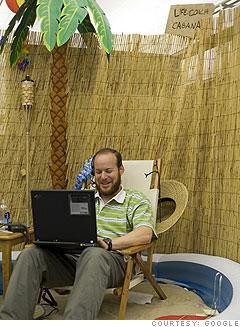
11. 2008年:全面对抗微软
google以31亿美元收购DoubleClick,后者正是微软CEO史蒂夫·鲍尔默(Steve Ballmer)梦寐以求的。google还与雅虎打成了搜索广告合作协议,这也是微软想要的。近日,google有推出了Chrome浏览器,目标直指IE。另外,基于 googleAndroid移动平台的手机HTC Dream(HTC G1)也有望于下月由多普达和T-mobile联合推出。
你知道吗:google2008年海外营收将首次超越国内营收。
营收:106亿美元(上半年)
利润:25.6亿美元(上半年)
营收涨幅:39%(托马斯财经预期)
员工数量:19604(截至6月30日)
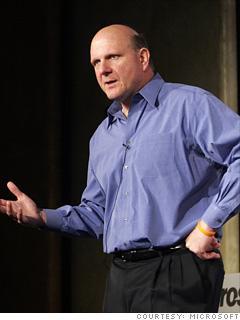
----------------------------------------------------------------------------------------
附送一篇美联社的报道。Google reigns as world's most powerful 10-year-old
Saturday September 6, 1:23 am ET
By Michael Liedtke, AP Technology Writer
Still feeling lucky: As Google turns 10, management searches for more frontiers to conquer
MOUNTAIN VIEW, Calif. (AP) -- When Larry Page and Sergey Brin founded Google Inc. on Sept. 7, 1998, they had little more than their ingenuity, four computers and an investor's $100,000 bet on their belief that an Internet search engine could change the world.
It sounded preposterous 10 years ago, but look now: Google draws upon a gargantuan computer network, nearly 20,000 employees and a $150 billion market value to redefine media, marketing and technology.
Perhaps Google's biggest test in the next decade will be finding a way to pursue its seemingly boundless ambitions without triggering a backlash that derails the company.
"You can't do some of the things that they are trying to do without eventually facing some challenges from the government and your rivals," said Danny Sullivan, who has followed Google since its inception and is now editor-in-chief of SearchEngineLand.
Google's expanding control over the flow of Internet traffic and advertising already is raising monopoly concerns.
The intensifying regulatory and political scrutiny on Google's expansion could present more roadblocks in the future. Even now, there's a chance U.S. antitrust regulators will challenge Google's plans to sell ads for Yahoo Inc., a fading Internet star whose recent struggles have been magnified by Google's success.
Privacy watchdogs also have sharpened their attacks on Google's retention of potentially sensitive information about the 650 million people who use its search engine and other Internet services like YouTube, Maps and Gmail. If the harping eventually inspires rules that restrict Google's data collection, it could make its search engine less relevant and its ad network less profitable.
To protect its interests, Google has hired lobbyists to bend the ears of lawmakers and ramped up its public relations staff to sway opinion as management gears up to conquer new frontiers.
"Google will keep pushing the envelope," predicted John Battelle, who wrote a book about the company and now runs Federated Media, a conduit for Internet publishers and advertisers. "It's one of the things that seems to make them happy."
In the latest example of its relentless expansion, Google has just released a Web browser to make its search engine and other online services even more accessible and appealing. Not every peripheral step has gone smoothly, though; several of the company's ancillary products have flopped or never lived up to the hype.
Extending Google's ubiquity to cell phones and other mobile devices sits at the top of management's agenda for the next decade.
But the lengthy to-do list also includes: making digital copies of all the world's books; establishing electronic file cabinets for people's health records; leading the alternative energy charge away from fossil fuels; selling computer programs to businesses over the Internet; and tweaking its search engine so it can better understand requests stated in plain language, just like a human would.
"There are people who think we are plenty full of ourselves right now, but from inside at least, it doesn't look that way," said Craig Silverstein, Google's technology director and the first employee hired by Page and Brin. "I think what keeps us humble is realizing how much further we have to go."
Page and Brin, both 35 now and worth nearly $19 billion apiece, declined to be interviewed for this story. But they have never left any doubt they view Google as a force for good -- a philosophy punctuated by their corporate motto: "Don't Be Evil."
"If we had a lightsaber, we would be Luke (Skywalker)," Silverstein said.
A "Star Wars" analogy can just as easily be used to depict Google as an imposing empire. It holds commanding leads in both the Internet search and advertising markets. The company processes nearly two-thirds of the world's online search requests, according to the research firm comScore Inc., and sells about three-fourths of the ads tied to search requests, according to another firm, eMarketer Inc.
The dominance has enabled Google to rake in $48 billion from Internet ads since 2001. Google hasn't hoarded all of that money: the company has paid $15 billion in commissions to the Web sites that run its ads during the same period, helping to support major online destinations like AOL, Ask.com and MySpace as well as an array of bloggers.
"Google is the oxygen in this ecosystem," Battelle said.
The company hopes to inhale even more Internet advertising from the biggest deal in its short history -- a $3.2 billion acquisition of online marketing service DoubleClick Inc. that was completed six months ago.
Google also is trying to mine more money from its second-largest acquisition, YouTube, the Internet's leading video channel. YouTube is expected to generate about $200 million in revenue this year, an amount that analysts believe barely scratches the video site's moneymaking potential.
Eventually, Google Chairman Eric Schmidt wants the entire company to generate $100 billion in annual revenue, which would make it roughly as big as the two largest information-technology companies -- Hewlett-Packard Co. and IBM Corp. -- each are now. This year, Google will surpass the $20 billion threshold for the first time.
Schmidt, 53, who became Google's CEO in 2001, seems determined to stick around to reach his goal. He, Brin and Page have made an informal pact to remain the company's brain trust through 2024, at least.
But some rivals are determined to thwart Google. TV and movie conglomerate Viacom Inc. is suing Google for $1 billion for alleged copyright infringement at YouTube, while Microsoft signaled how desperately it wants to topple Google by offering to buy Yahoo for $47.5 billion this year.
Microsoft withdrew the takeover bid in a dispute over Yahoo's value, but some analysts still think those two companies may get together if they fall farther behind Google.
The notion that Microsoft -- the richest technology company -- would spend so much time worrying about Google seemed inconceivable in September 1998, when Page and Brin decided to convert their research project in Stanford University's computer science graduate program into a formal company.
Page, a University of Michigan graduate, and Brin, a University of Maryland alum, began working on a search engine -- originally called BackRub -- in 1996 because they believed a lot of important content wasn't being found on the Web. At the time, the companies behind the Internet's major search engines -- Yahoo, AltaVista and Excite -- were increasingly focused on building multifaceted Web sites.
Internet search was considered such a low priority at the time that Page and Brin couldn't even find anyone willing to pay a couple of million dollars to buy their technology. Instead, they got a $100,000 investment from one of Sun Microsystems Inc.'s co-founders, Andy Bechtolsheim, and filed incorporation papers so they could cash a check made out to Google Inc. In a nod to their geeky roots as children of computer science and math professors, Page and Brin had derived the name from the mathematical term "googol" -- a 1 followed by 100 zeros.
Later they would raise a total of about $26 million from family, friends and venture capitalists to help fund the company and pay for now-famous employee perks like free meals and snacks.
Even after Google became an official company in 1998, the business continued to operate out of the founders' Stanford dorm rooms.
Like Google's stripped-down home page, the company itself had a bare-bones aesthetic. Page's room was converted into a "server farm" for the three computers that ran the search engine, which then processed about 10,000 requests per day compared with about 1.5 billion per day now. The headquarters were in Brin's room in a neighboring dorm hall, where the founders and Silverstein wrestled for control of another computer to bang out programming code.
Within a few weeks after incorporating, Google moved into the garage of a Menlo Park, Calif., home owned by Susan Wojcicki, who became a Google executive and is now Brin's sister-in-law (Google bought the house in 2006). Even back in 1998, there was some free food -- usually bags of M&Ms and Silverstein's homemade bread.
Jump back to today: The company occupies a 1.5 million-square-foot headquarters called the "Googleplex" -- as well as two dozen other U.S. offices and hubs in more than 30 other countries. And its search engine -- believed to index at least 40 billion Web pages -- now runs on hundreds of thousands of computers kept in massive data centers around the world.
The growth dumbfounds Silverstein, whose only goal when he started was to help make Google successful enough to employ 80 people.
"It's natural when a company gets big that some people become fearful of that," Silverstein said. "All we can do is to be as upfront and straightforward as possible. We are not trying to be malicious or have some sneaky plan to put you in our thrall. There are some people who will never believe that."
A glimpse at what Google looked like in 1998:
http://web.archive.org/web/19981111183552/google.stanford.edu
Google's philosophy:
文章评论